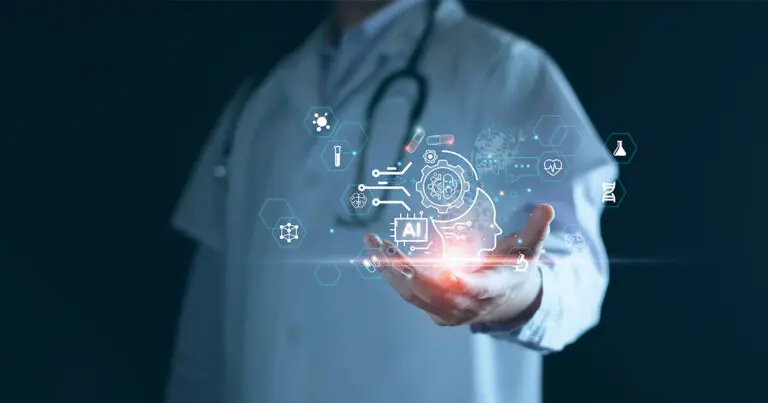How AI is Transforming the Healthcare Industry and What the Future Holds

The rise of artificial intelligence (AI) in the healthcare industry is leading to transformative changes in patient care, diagnosis, and treatment.
These advancements are not only enhancing operational efficiency but also paving the way for new and innovative approaches to medical practice.
As we explore the current applications of AI in healthcare, it’s important to consider the potential and speculative nature of these technologies.
his article will delve into how AI is currently being used in healthcare and provide insights into what the future might hold.
Current applications of AI in healthcare
AI in diagnostics
AI is making significant strides in medical diagnosis, particularly in disease diagnosis through early detection.
Deep learning algorithms are being developed to analyze medical images, such as those from radiology and pathology, to identify patterns that may indicate the presence of diseases like cancer and cardiovascular conditions.
These AI-powered diagnostic tools, including imaging analysis and pattern recognition software, are enhancing the ability of healthcare professionals to make more accurate diagnoses.
Although AI in diagnostics shows great promise, its effectiveness still depends on healthcare provider oversight and interpretation.
AI in treatment planning
AI is also revolutionizing treatment options by assisting in the creation of personalized care plans.
For example, in oncology, AI algorithms analyze patient data, such as medical history and clinical documentation, to suggest the most effective treatment strategies.
These AI-driven insights help in the management of chronic diseases and enable medical professionals to deliver more targeted therapies.
However, while AI offers valuable recommendations, it is critical to view these suggestions as complementary to the judgment of human clinicians.
AI in drug discovery and development
In the realm of drug discovery, AI is accelerating the process by predicting drug efficacy and potential side effects more efficiently than traditional methods.
AI-driven models analyze vast datasets to identify promising compounds and optimize drug manufacturing processes.
Several case studies have demonstrated AI’s potential to reduce the time and cost of developing new drugs.
Yet, the drug discovery process remains complex, and AI’s role, while expanding, is one part of a broader, collaborative effort in pharmaceutical research.
AI in patient monitoring and care
AI is enhancing patient monitoring through remote monitoring systems and wearable devices that track vital signs in real time.
These technologies are particularly beneficial for managing chronic diseases and improving patient outcomes by enabling timely interventions.
For instance, AI can identify patients at risk of deterioration and alert medical providers for prompt treatment.
As healthcare systems adopt these tools, the role of AI in real-time patient care is likely to grow, though it will need to be integrated thoughtfully into clinical practice to maximize its benefits.
The impact of AI on healthcare professionals and patients
Enhancing the role of healthcare professionals
AI is proving to be a valuable tool in supporting, rather than replacing, healthcare professionals.
By automating repetitive tasks such as clinical decision-making and administrative tasks, AI allows doctors to focus more on the direct care of patients.
This technology also aids in reducing administrative burdens, thereby improving the overall experience of care.
As AI continues to develop, it is essential to ensure that it enhances the capabilities of human physicians rather than diminishing their role.
Improving patient experience
AI is also improving the patient experience by providing more personalized interactions and support.
AI-driven chatbots and virtual assistants are increasingly used in healthcare delivery to answer patient questions, schedule appointments, and offer medical advice.
These tools help streamline the patient flow and enhance the overall experience of care.
However, it is important to balance the use of AI with the need for personal interaction in healthcare systems, ensuring that patients receive relevant and compassionate care.
Challenges and ethical considerations
Data privacy and security concerns
The use of AI in healthcare brings significant data privacy and security challenges.
Handling sensitive medical records within AI systems requires stringent cybersecurity measures to protect patient information.
As healthcare organizations continue to integrate AI into their operations, ensuring the security of electronic health records and other personal data must remain a top priority.
Bias in AI algorithms
Bias in AI-driven healthcare tools is another critical issue.
AI systems rely on data, and if the data used is not diverse, there is a risk of bias that can affect health outcomes.
Ensuring that AI algorithms are trained on a wide range of multimodal datasets is crucial to provide fair and accurate healthcare solutions.
Addressing this challenge is essential to avoid disparities in the standard of care provided to different patient groups.
Ethical implications of AI in decision-making
The integration of AI into healthcare decision-making raises several ethical questions, especially in life-or-death situations.
While AI can offer valuable insights, it is important to maintain a balance between AI recommendations and the clinical intelligence of medical professionals.
Responsible AI-augmented healthcare practices must ensure that human judgment remains central in critical decisions.
The future of AI in healthcare
Predictive analytics and preventative care
AI’s potential in predictive analytics is poised to shift healthcare towards more proactive and preventative models.
By analyzing patterns from clinical images and other health data, AI could predict health issues before they arise, allowing for earlier intervention and improved health outcomes.
This represents a significant shift from the traditional reactive approach to healthcare, though the accuracy and reliability of such predictions will be key to their adoption.
AI in robotic surgery
The future of AI in robotic surgery holds promise for more precise and less invasive procedures.
AI-assisted robotic systems can enhance the capabilities of surgeons, leading to better patient outcomes.
While AI-augmented healthcare systems are still evolving, advancements in this area could lead to significant improvements in surgical precision and recovery times, although widespread adoption will require rigorous testing and validation.
AI in genomics and personalized medicine
AI is also expected to play a significant role in personalized medicine by advancing our understanding of genetic information.
By integrating genetic data with AI insights, healthcare providers can offer more personalized treatment options tailored to individual patients.
This could revolutionize the field of healthcare applications, particularly in the treatment of complex diseases.
However, the full potential of AI in this area will depend on continued research and ethical considerations.
AI and healthcare accessibility
AI has the potential to democratize healthcare by making medical services more accessible, particularly in underserved communities and regions.
AI-driven solutions could provide timely care in areas lacking sufficient healthcare clinics and social care services.
As health equity becomes a growing concern, AI could play a key role in ensuring that more people have access to high-quality care pathways.
Potential AI jobs in the healthcare industry
While AI holds great potential, it is still important to remember the humans behind the scenes that make it all possible.
The growing integration of AI in healthcare is creating new job opportunities, such as AI specialists and healthcare data analysts. These roles require individuals with a strong understanding of both AI technology and the healthcare industry.
AI roles in healthcare can include:
- AI specialist in healthcare diagnostics: Developing and implementing AI algorithms for medical diagnosis and medical imaging.
- AI-powered health data analyst: Analyzing health data using AI to improve patient outcomes and disease management models.
- AI in drug development: Working on AI-driven solutions in the drug discovery process to identify new therapies.
- AI-enhanced robotic surgery technician: Operating and maintaining AI-assisted surgical robots for precision surgeries.
- AI in remote monitoring systems: Designing and managing AI-based remote monitoring solutions for chronic diseases.
- AI in personalized medicine: Utilizing AI to develop and apply personalized treatment plans based on genetic and health data.
AI and its applications in the healthcare industry
AI is undoubtedly transforming the healthcare sector, offering new tools and technologies that have the potential to enhance patient care and health outcomes.
However, as we look to the future, it is crucial to ensure that AI development in healthcare is responsible and ethical, addressing concerns such as data privacy, bias, and the role of human judgment.
By staying informed and engaged with these advancements, both healthcare professionals and patients can better navigate the evolving landscape of AI-augmented healthcare.
Looking to hire top-tier Tech, Digital Marketing, or Creative Talent? We can help.
Every year, Mondo helps to fill over 2,000 open positions nationwide.
More Reading…
- The Growing Importance of Embracing Neurodiversity in the Workplace
- 8 Traits of “Good Bosses” People Want to Work For
- Preparing for Gen Alpha: the Next Generation of Workers
- Why Is Diversity in Leadership Important? Top Benefits & Strategies
- CrowdStrike Outage Highlights Importance of Incident Response Planning
- How to Attract Top Talent with a Strong Employer Brand
- How to Measure and Improve Remote Employee Productivity
- How To Use Predictive Analytics to Forecast Hiring Needs
- Top Marketing Automation Tools and How to Leverage for Your Business
- The Impact of AI on Human Resources: Opportunities and Challenges
- 7 Benefits of Cross-Training Employees: Examples & Best Practices



